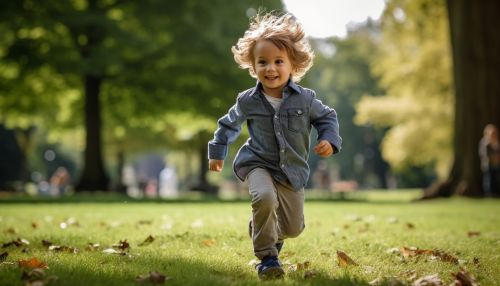Motor Skills
Introduction
Motor skills are the coordinated movements produced by the muscles in response to the brain's signals. They are categorized into two main types: gross motor skills and fine motor skills. Gross motor skills involve the larger muscles in the arms, legs, and torso, while fine motor skills involve smaller muscle movements, particularly in the hands and fingers. The development of these skills is a critical aspect of human development, and it is influenced by a variety of factors, including genetics, environment, and physical health.
Gross Motor Skills
Gross motor skills are those that require whole body movement and involve the large (core stabilizing) muscles of the body to perform everyday functions, such as standing, walking, running, and sitting upright. It also includes skills such as climbing, jumping, or kicking. These abilities share connections with other physical functions, such as hand-eye coordination.


Development of Gross Motor Skills
The development of gross motor skills starts in infancy and continues into adolescence. It begins with simple movements like lifting the head and rolling over and progresses to more complex tasks like walking and jumping. The development of these skills is influenced by a variety of factors, including physical strength and muscle tone, coordination, balance, and cognitive development.
Assessment of Gross Motor Skills
The assessment of gross motor skills is often part of a pediatric evaluation. It can help identify developmental delays and conditions that affect motor function, such as cerebral palsy or muscular dystrophy. Assessment tools include standardized tests, observations of the child's movements, and parent reports.
Fine Motor Skills
Fine motor skills are those that require a high degree of control and precision in the small muscles of the hand (and fingers). These skills are important for performing tasks such as writing, buttoning, and using a computer mouse.
Development of Fine Motor Skills
The development of fine motor skills begins in infancy with actions such as grasping a finger or toy. As children grow, their fine motor skills develop further, allowing them to perform more complex tasks. The development of these skills is influenced by factors such as hand-eye coordination, cognitive development, and physical health.
Assessment of Fine Motor Skills
The assessment of fine motor skills can help identify developmental delays and conditions that affect motor function. Assessment tools include standardized tests, observations of the child's movements, and parent reports. Occupational therapists often play a key role in assessing and supporting the development of fine motor skills.
Motor Skills and Cognitive Development
Motor skills are closely linked to cognitive development. As children develop motor skills, they also develop their understanding of the world around them. For example, through manipulating objects, children learn about their properties and uses. Motor skills also support cognitive processes such as problem-solving and planning.
Motor Skills Disorders
Motor skills disorders are a group of disorders that affect the coordination of movement. They include conditions such as developmental coordination disorder, cerebral palsy, and muscular dystrophy. These disorders can affect both gross and fine motor skills and can have a significant impact on a person's ability to perform daily activities.
Conclusion
Motor skills are essential for performing everyday activities and interacting with the world around us. They develop throughout childhood and are influenced by a variety of factors, including physical health, cognitive development, and the environment. Understanding and supporting the development of motor skills can help individuals lead more independent and fulfilling lives.
